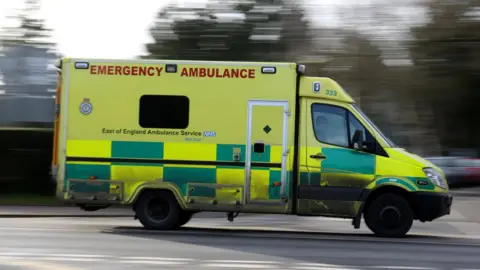NHS East of England ambulances face '20 hour delays'
 Getty Images
Getty ImagesThe East of England Ambulance Service is taking up to 20 hours to reach some non-critical patients, staff said.
The NHS service has also not been responding to some lower category calls due to pressures, they said.
The service has been at "Surge White" for the past month, the highest alert level, according to sources.
Trust chief executive Tom Abell said: "We are currently experiencing some of the most significant and sustained pressures in recent years."
The identity and job titles of the sources have been verified by the BBC.
An East of England Ambulance Service NHS Trust spokesman confirmed that it had a protocol called Emergency Operations Centre Standard Operating Procedure (ESOP) 48 where a temporary suspension of sending ambulances to category 3 and category 4 calls is brought in.
But these decisions were made on a clinical basis, he said.
One staff member described a service struggling with a high volume of calls and high staff sickness levels which had led to gaps in rotas.
The official sickness absence rate across the entire trust is currently almost 4%, but the source said it had reached 12% in some areas.
They said colleagues were "too exhausted" to take up an offer of £25 per hour in overtime payments to cover selected shifts.
An internal document offering the payment also included an undertaking to not go off sick for a fixed period.
'Verbally abused'
Control room staff were described as struggling to respond to the high volume of emergency calls.
One worker said: "Staff constantly call back patients who are [waiting]... and tell them their injuries don't require any ambulance attendance or they should make their own way to hospital because of the delays, just to reduce call volume to a non-critical level."
"Every shift control room staff are sworn at and verbally abused by callers demanding ambulances which are not available because they spend as many as five hours in long queues outside A&E waiting to unload."
Another staff member lamented the high number of 999 callers who wanted ambulances for trivial reasons.
On some shifts, they said, only two out of every 20 callers who had been triaged actually required an emergency vehicle.
According to them "people are using us as a taxi service. Everything is 'call an ambulance'. That's the problem. Pressures on the service are phenomenal".
'Risk averse' culture
One employee was also critical of NHS 111 providers and GP surgeries, who, in their view, were taking up ambulance resources unnecessarily.
They described a "risk averse" culture among these services in which an ambulance was being requested for non-urgent cases.
"I get verbally abused every shift when 111 call handlers tell relatives that they are sending an ambulance to the patient's address," they said.
"Then they pass the details to 999 who call back to say they don't need an ambulance attendance.
"GP services tell patients that they can't have an appointment for two weeks, but tell them to call 999 instead for trivial injuries or medication issues that neither 999 or A&E can resolve."
One of the main providers of NHS 111 services in the eastern England, IC 24, said it the third lowest rate for dispatching ambulances to non-urgent calls in the country.
Dr Rab McEwan, its chief operating officer, said: "IC24 supports the East of England Ambulance Service Trust at these times of unprecedented pressures on paramedic services across the country, and we would urge all members of the public to use the full range of alternative non-emergency services other than 999, including our 111 service."
Another operator, HUC, said it was working with the ambulance service "to provide much-needed care to patients".
'Put through the wringer'
The union Unison said its members were "being battered from every side".
Eastern regional organiser Sam Older said: "Ambulance staff are being put through the wringer like never before.
"We're still seeing huge numbers sick or isolating because of Covid. Even when people recover increasing numbers are suffering the effects of long Covid, leaving them unable to come into work as much as they'd like.
"While there are fewer staff available, we're also seeing rising numbers of calls, taking ambulance crews longer to get to the people who need them."
It wasn't just paramedics and technicians off sick and overworked, he said, but also call handlers and dispatchers.
Unison said hospital A&E staff were overwhelmed with Omicron cases and could not admit new patients quickly enough and this was coupled with delays in discharging patients to social care.
"Hospitals' inability to deliver elements of urgent care also leaves ambulance crews picking up the pieces," Mr Older said.
Tom Abell, ambulance service chief exec, said they were taking a range of steps to respond to the pressures "in partnership with our partners across the NHS".
"This includes strengthening clinical triage within our control centres so we can make sure we see the most clinically urgent patients, increasing the number of patients who we send to other NHS services where they do not require an ambulance, and taking steps to increase the number of ambulances we have available, such as offering additional overtime and working with private ambulance providers," he said.
"We are also working with hospitals to put in place arrangements to reduce handover delays."
The ambulance service covers Bedfordshire, Cambridgeshire, Essex, Hertfordshire, Norfolk and Suffolk.

Find BBC News: East of England on Facebook, Instagram and Twitter. If you have a story suggestion email [email protected]
